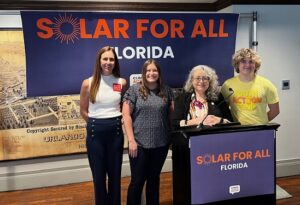Orlando State Representative Jennifer “Rita” Harris joined public officials and clean energy leaders to highlight how the Greenhouse Gas Reduction Fund, a historic $27 billion investment to combat the climate crisis, is making a positive impact on local disadvantaged Orlando communities that have historically been left behind.
The federal Inflation Reduction Act authorized the U.S. Environmental Protection Agency to create and implement the Greenhouse Gas Reduction Fund (GGRF). The program builds on the successful track records of green and community-based lenders across the country, providing federal funding to help scale sustained investment in low- and zero-pollution projects.
 Under the $7 billion Solar for All program, a component of the GGRF, Solar and Energy Loan Fund Florida (SELF FL) – a member of the ‘Florida Solar For All’ coalition which includes Solar United Neighbors and The Nature Conservancy in Florida – was selected as one of the grant recipients for funds intended to expand the number of low-income and disadvantaged communities primed for distributed solar investment.
Under the $7 billion Solar for All program, a component of the GGRF, Solar and Energy Loan Fund Florida (SELF FL) – a member of the ‘Florida Solar For All’ coalition which includes Solar United Neighbors and The Nature Conservancy in Florida – was selected as one of the grant recipients for funds intended to expand the number of low-income and disadvantaged communities primed for distributed solar investment.
The Solar for All program, established under President Biden’s Inflation Reduction Act (IRA), aims to expand access to solar energy in low-income and disadvantaged communities. The Florida Clean Energy Fund will receive $156,120,000 to enable these communities in Florida to deploy and benefit from solar energy. This funding will lower energy bills, reduce pollution, increase power resiliency, invest in local businesses, and create quality jobs.
“The Solar for All grant will dramatically improve energy access for low-income and disadvantaged residents in the Orange County area. This initiative will not only help address climate change but also ensure our communities are better prepared for extreme weather conditions,” stated District 44 State Representative Rita Harris, a Democrat. “By expanding solar energy access, we are fostering environmental justice and positioning Florida to be a leader in the clean energy economy. Solar is one of the fastest-growing energy sources, and this grant will help make it accessible to those who need it most.”
More than two-thirds of all GGRF funding will go to communities that often struggle to access capital for projects that reduce pollution and lower household energy bills, including communities of color and low-income, disadvantaged, rural, Tribal, and energy transition communities. In Florida, this includes significant investments in solar energy projects aimed at reducing energy costs and improving air quality in underserved areas.
“Young people understand the critical role that federal funding for climate solutions must play in shaping our future,” said Cameron Driggers, Executive Director of Florida Youth Action Fund. “At this moment, the worst impacts of the climate crisis have already begun to set in across Florida and its equatorial neighbors. Florida’s youth are counting on lawmakers to not only defend public investment into the Greenhouse Gas Reduction Fund (GGRF), but to further expand resources for sustainability and decarbonization projects in a way that allows for the transformative change required to halt more irreversible climate change.”
“This (GGRF) historic funding will make solar energy accessible to those who need it most,” said Duanne Andrade, Executive Director at SELF Florida. “SELF is eager to put these funds to use by launching programs that provide direct grants and low cost financing options for rooftop solar on single-family homes, affordable multifamily housing, nonprofit, and commercial projects that benefit low and moderate income communities. These funds will help unlock rebates and tax credits previously unavailable to low wealth, vulnerable communities, and will create work opportunities for local contractors. The Solar for All grant funds will enable rooftop solar on low income homes to reduce utility bills. The Greenhouse Gas Reduction Grant funds from the EPA are essential to overcoming the financial and market barriers that prevent low-income households from unlocking energy savings through solar.”
While the EPA is moving the ball forward, the Democratic State Rep. warned the program is still under threat from opponents who are putting polluters over people and gambling with jobs, economic future, and health.
“This Solar for All grant is a game-changer for Orlando and all of Florida, ensuring that low-income and disadvantaged residents can access affordable solar energy,” said Heaven Campbell, Florida Program Director at Solar United Neighbors. “With this funding, we will implement programs tailored to provide significant rebates and financing options for rooftop solar installations on single-family homes and affordable multifamily housing. This initiative will help reduce utility bills, promote local job creation, and enhance energy resilience for some of our most vulnerable communities. By breaking down financial barriers, we are paving the way for a cleaner, more equitable energy future in Orlando.”
“Expanding solar access through the GGRF will significantly improve the health of our children by reducing pollution that is fueling climate change and creating cleaner environments,” said Emily Pickett, Florida Field Organizer at Moms Clean Air Force. “Cleaner air means fewer asthma attacks and respiratory issues for kids in our community. Orlando was ranked among the top 20 asthma capitals in the U.S., so this is a pressing issue for our communities. This funding can make a profound difference in public health and provide a safer, healthier future for our children.”
Speakers highlighted how rolling back components of GGRF – as proposed by some opponents to climate action – would rob communities of cleaner air and water and drive more pollution into communities already struggling with the negative health consequences of dirty energy.


